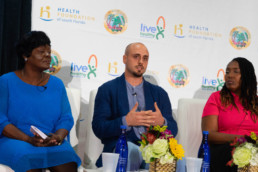Overview
Mental Health includes emotional, psychological, and social well-being. It affects how we think, feel and act as we cope with daily stressors of life. It also helps determine how we handle stress, relate to others, and make choices. Mental Health is important at every stage of life, from childhood and adolescence through adulthood.
In 2017, 37.5% of Miami Gardens’ population was obese and 37.3% of residents held jobs that are sedentary. In surveys and focus groups conducted in 2014, 27.3% of residents stated they did not have time for physical activity in the past month. In the same community surveying process, residents identified the lack of physical activity as the number one community health issue facing the City. Based upon what we learned from the community surveys and data, LHMG selected a mix of programmatic and environmental change strategies to expand community opportunities and interest in physical activity.
In 2017, emergency room visits in Miami Gardens due to mental disorder diagnoses was 73.3 per 10,000 adults. In zip code 33054, the rate was as high as 106.9 per 10,000. The average number of days where poor mental or physical health interfered with activities of daily living was also an issue of concern. In 2017, over the course of a month, adults and adolescents in Miami-Dade County reported having at least one day where poor mental health interfered with activities of daily living. Equally important was the need to increase awareness and concern regarding the impact of stress, its prevention and treatment, and the need for enhanced coping skills.
LHMG has implemented several strategies to decrease the number of Miami Gardens residents with unmet mental health needs by increasing community and institutional resources and capacity to support improved mental health.

Strategies
- Train Miami Gardens’ residents, service providers, law enforcement and other first responders in Mental Health First Aid to assist in identifying and supporting at-risk residents.
- Build the capacity of stakeholders to implement and promote Self-Help and Peer Support Groups in Miami Gardens.
- Educate and train primary health care providers to screen for and link patients to needed mental health and substance abuse services identified through appropriate screenings including the SBIRT (Screening, Brief Intervention, and Referral to Treatment) and other evidence based screening tools.
- Create a Resource Directory Platform that is localized and contain formal and informal resources to help Miami Gardens residents resolve their health, social and behavioral health needs.
- Build the capacity of Miami Gardens based community agencies to implement SBIRT in a manner that is sustainable, feasible, and that ultimately leads to the improved health and wellness of the Miami Gardens community. SBIRT (Screening, Brief Intervention, and Referral Intervention and Referral to Treatment) is an evidenced-based practice used to identify, reduce and prevent problematic use, abuse and dependence on alcohol and illicit drugs.


SBIRTH
Working with University of Miami, the SBIRT Implementation Project focuses on building the capacity of six (6) community agencies to implement SBIRT in ways that are sustainable, feasible, and that ultimately lead to the improved health and wellness in the City. SBIRT (Screening, Brief Intervention, and Referral Intervention and Referral to Treatment) is an evidence based intervention used to identify and intervene early with individuals who use alcohol and substances in ways that increase their risk of physical health, mental health, or social problems. Currently, the six organizations participating in the project are: Concerned African Women; Federation of Families; Fresh Start; Optimal Health; Center for Family and Child Enrichment; and Community for Life.
Accomplishments to Date
- Successfully increased the capacity of more than 400 Miami Gardens stakeholders to better serve residents experiencing mental illness by training residents, service providers, law enforcement and other first responders in Mental Health First Aid to assist in identification and support for at risk residents.
- Build the capacity of six (6) local social services agencies to provide evidence-based Self–Help and Peer Support Groups for residents dealing with social and emotional stress, resulting in ten newly trained Wellness Recovery Action Plan (WRAP) facilitators. WRAP is an internationally recognized practice that can be used by support groups or individuals to reach higher levels of awareness, empowerment and wellness. Phase One was an eight session, one hour per week introduction to WRAP and the Peer Support model with individuals using the concepts of WRAP for their own wellness and/or recovery. Phase Two supported the opportunity for each organization to identify individuals to work toward certification through a five-day, 40-hour WRAP Facilitator Certification Course. As a result, 66 individuals from five (5) Miami Gardens based organizations completed the eight-session WRAP peer support workshops.
- Supported the ten (10) newly trained WRAP Facilitators in providing WRAP sessions internally throughout their organizations. To date, more than 65 individuals have been trained on WRAP and Peer Support, affording our community the opportunity for self-awareness, education, empowerment and improvement while facing life challenges.
- Completed a Needs Assessment and Feasibility Study to educate and train primary health care providers to screen for and link patients to mental health and substance abuse services identified through appropriate screenings including the SBIRT (Screening, Brief Intervention, and Referral to Treatment) and other evidence based screening tools.
- Conducted a Mental Wellness Forum to demystify and normalize mental wellness attended by more than 100 people and viewed over 1,300 times on social media.